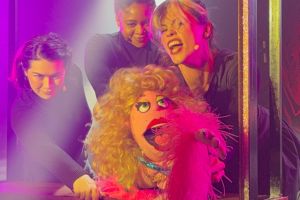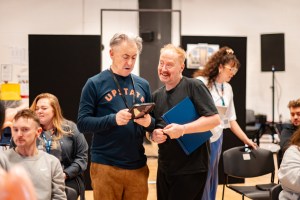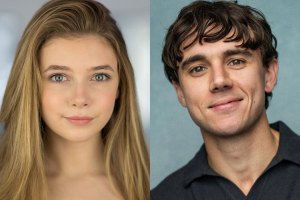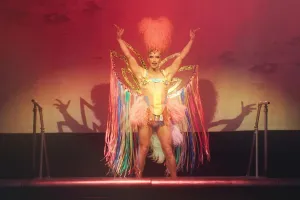Brief Encounter With … King’s Speech star Charles Edwards
Charles Edwards plays King George VI in the premiere production of David Seidler’s The King’s Speech, which opens at the West End’s Wyndham’s Theatre this week (27 March 2012, previews from 22 March).
As has already been well-documented, the play became an Oscar-winning film starring Colin Firth and Geoffrey Rush after director Tom Hooper’s parents saw a read-through at the Pleasance Theatre and passed the script on to their son.
The stage premiere is directed by former RSC artistic director Adrian Noble and also stars Jonathan Hyde as Australian speech therapist Lionel Logue, Emma Fielding as Queen Elizabeth, Joss Ackland as George V and Ian McNeice as Winston Churchill.
Edwards played the lead role of Richard Hannay in the Olivier Award winning West End production of The 39 Steps and later on Broadway. He most recently appeared as Benedick, opposite Eve Best, in the Whatsonstage.com Award-nominated Much Ado About Nothing at Shakespeare’s Globe and in Peter Hall’s production of Twelfth Night at the National Theatre.
What were your first thoughts when you got the role of George VI?
I was very excited about the fact that it had been a play once upon a time before the film. I hadn’t actually seen the film when I got the role; not through avoiding it but I’m just quite lazy about going to the movies. I got the job and thought ‘I should watch the movie, just to see.’ And it’s a beautiful piece of work, of course. But there’s stuff in the play that isn’t in the film and I was attracted by that; I was concerned that there wasn’t a reason for doing it, but clearly there is. Although they come from the same pen, they’re very different entities and I was interested in how we would make it theatrically satisfying to do, which we’ve achieved.
What are the main differences between the play and the film?
There’s a lot more of the political background in the play, which is fascinating stuff. There’s also a lot more of Churchill, Baldwin and Cosmo Lang, the Archbishop of Canterbury. You get much more idea of the machinations behind the throne; the King can often seem like a puppet and the strings are being pulled by these characters who lurk in the shadows. And Logue’s wife Myrtle (played by Jennifer Ehle in the movie), also has a much bigger role. When David created the character of Myrtle, as far as I understand, they were planning on including her more in the movie. But then Logue’s diaries surfaced and it turned out that the real Myrtle was nothing like the character that David invented for dramatic purposes, so they felt that they couldn’t really include that. But she’s reinstated in the play and it works very well, and is beautifully played by Charlotte Randle – it’s a very moving counterbalance for the main story. Comparison is inevitable, but it’s a very satisfying piece of theatre in its own right.
How did you approach the role?
The stammer is something that I took very seriously. A lot of the blurb about The King’s Speech is generally about George VI ‘overcoming’ his stammer. But you never overcome a stammer, you learn to manage it. I think that’s a very important point to make and I know it’s a point that the British Stammering Association are keen to make, too. David Seidler has a stammer; he’s very open about it, it’s not something he hides, but he manages it extremely well. You wouldn’t know it to meet him. It’s about understanding how a stammerer manages. It’s about negotiating your way through a sentence – changing a ‘P’ at the beginning of a word to a ‘C’ – just to avoid the little pitfalls.
I met with a wonderful lady called Annie Morrison, who’s a voice teacher at the Central School and was a speech therapist for stammerers. I had two sessions with her, learning about the technicality and physicality of the stammer and what can accompany it. And we’ve also drawn on footage of the man himself, George VI, and you do see he has terrible trouble. In rehearsal we had a both an edited and an unedited version of a speech he made. In the edited version they used cut-away shots of people listening to cover the gaps. But in the unedited version you see his struggle and it’s heartbreaking to watch.
How big an influence was Colin Firth’s interpretation?
Well it’s a wonderful performance, but then you have to get on with your own thing. It hasn’t troubled me, it hasn’t really been in my mind; the film is not something I think about.

Is it at all daunting to be coming to the West End?
I’m thrilled with the theatre, I think Wyndham’s perfect. It’s sort of a chamber piece, this play. The cast is small and I think it needs an intimate theatre like Wyndham’s; I couldn’t be happier with that result. I’m keen for as many people to see it as possible. I want people to come and be pleasantly surprised at the additional content and to enjoy it as much as they have been on tour. The reaction has been more than we could have hoped for. The cheering and people standing up – it’s very exciting and rewarding to please people in that way. So, no, I’m not daunted but I’m very excited.
Are you expecting a royal visit?
Well you never know – that would be quite something!
Do you agree with commenters who say the West End has become more conservative in the recession?
There’s certainly a lot of comedy around. The 39 Steps that I did a few years ago is a simpler, nostalgic entertainment, and has been followed by the likes of The Ladykillers and One Man, Two Guvnors. Perhaps it’s linked to the “keep calm and carry on” resurgence that’s been happening over the last few years. I think it’s probably the rise in technology; we’re in an increasing virtual world and as a consequence people like to hop back, in a way, into something more old-fashioned. There’s something in the air that’s making people crave something simpler, less demanding. I hate to use the word ‘cosy’ because it’s not. But it’s reassuring. I guess that’s always been popular, the sort of Sunday night drama. It seems to repeatedly hit a chord with the British.
What’s next for you?
Recently I played Michael Palin in this Monty Python film called Holy Flying Circus. I just loved that because pure comedy is a world that I hitherto have not had much experience of. So something more in that direction would be good. I also love the Globe, and I loved Benedick. While you’re doing a job you say ‘I really love doing this’ but then something else comes out of the blue and you love that just as much so it’s just a question of being asked to do nice things by good people. Anyway, that’s all for the future; The King’s Speech will hopefully go for a long time yet.
– Charles Edwards was speaking to Theo Bosanquet













